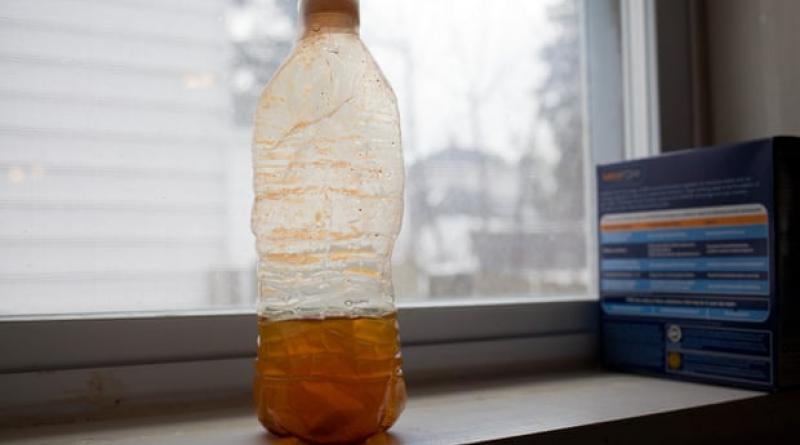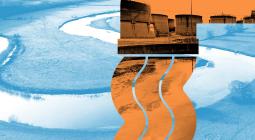The US is in a water crisis far worse than most people imagine.

Industrial runoff and lax standards have tainted water across the US. Senators and doctors are calling me, asking what to do.
When I was a little girl, my father would sing songs to me all the time about water. Sometimes, we would be playing down at the creeks and he would make up little tunes: “See that lovely water, trickling down the stream, don’t take it for granted, someday it might not be seen.”
My dad worked for many years as an engineer for Texaco and later for the Department of Transportation. Before he died, he told me that in my lifetime water would become a commodity more valuable than oil or gold, because there would be so little of it. Sadly, I believe he was right.
Our water has become so toxic that towns are issuing emergency boil notices and shipping in bottled water to their residents. In 2016, as I started research for my new book Superman’s Not Coming: Our National Water Crisis and What We the People Can Do About It, members of our very own US Congress had their water shut down in Washington due to unsafe lead levels.
We are in a water crisis beyond anything you can imagine. Pollutionand toxins are everywhere, stemming from the hazardous wastes of industry and agriculture. We’ve got more than 40,000 chemicals on the market today with only a few hundred regulated. We’ve had industrial byproducts discarded into the ground and into our water supply for years. This crisis affects everyone – rich or poor, black or white, Republican or Democrat. Communities everywhere think they are safe when they are not.
Each water system is unique, but some of the most toxic offenders include hexavalent chromium (an anticorrosive agent), PFOA (used to make Teflon pans), PFOS (a key ingredient in Scotchgard), TCE (used in dry cleaning and refrigeration), lead, fracking chemicals, chloramines (a water disinfectant) and more. Many of these chemicals are undetectable for those drinking the water. Many cause irreversible health problems and people in communities throughout the country are dealing with these repercussions.
Like a blood test for disease, you can only find what you test for. If you don’t order a specific test for one of these chemicals, you won’t know it’s there. And you can’t treat water unless you know what’s in it.
Now, I know what you might be thinking. What about the EPA, Erin? What about corporate remediation departments? Aren’t the experts handling it?
The short answer is no.
These issues start with tiny seeds of deception that add up over months and years to become major problems. Our resources are exhausted. Corruption is rampant. Officials are trying to cover their tracks. People are not putting the pieces together when it comes to the severity of this crisis. I’ve got senators and doctors calling me, asking me what to do.
As if poisoned water wasn’t a big enough issue, the last six years (2013–2019) have been the hottest years on record. As our climate changes, and we experience more droughts, floods, superstorms, melting glaciers and rising sea levels, we are seeing greater strains on our water supplies and infrastructure.
Superman is not coming. If you are waiting for someone to come save you and clean up your water, I’m here to tell you: no one is coming to save you. The time has come for us to save ourselves.
But before you despair, I want to remind you that we are in this together. No one person must – or can – fix it alone. No one senator, one community member, CEO, mom or dad. We’ve got to work together.
Even in the movie that shares my name, we had a team working around the clock. I went door-to-door to talk with residents who had concerns and were asking good questions. We hosted community meetings. We worked with some of the best legal teams, researchers and academics in California. It was not a one-woman or one-man job. We fought together.
I’ve noticed over the years that when I visit towns and work with people, the number one thing everyone seems to need is permission. They are looking for someone to tell them that it’s OK to move forward or speak out.
It’s not always easy. We’re taught from the time we’re young to ask for permission: permission to leave the dinner table, permission to use the bathroom during class. As we get older, we must get permits to build an addition on to the house. We sign permission slips for our kids to go on field trips. All these little acts add up and then we think: who am I to stand up at a city council meeting and ask a question? We all have these doubts and questions. In the end, I think that the permission we are seeking is more about support. We want to know that if we take action, it will be successful and that our community will stand by us.
Consider this your personal permission slip. Yes, you have permission to ask questions. Yes, you have permission to scrutinize your water professionals to see if they have the right credentials. Yes, you have permission to start a Facebook group to make more people aware of your cause. You have permission to stick up for yourself when it comes to your health, your family, your life.
The first action that you can take is to become part of what I hope will be the first-ever national self-reporting registry. This crowd-sourced map allows individuals and community groups to report and review health issues (cancer being the most prevalent) and community environmental issues by geographic area and by health topic. The research is intended to connect the dots between clusters of illness and environmental hazards in specific communities and regions of the country. If you or someone you know is sick or suffering, please report it.
None of us need a PhD or a science degree, or need to be a politician or a lawyer, to protect our right to clean water. We have the power together to fight for better enforcement of environmental safety laws, to push for new legislation, and to storm our city halls until our voices are heard and the water is safe for everyone to drink.
-
Erin Brockovich is a consumer advocate and environmental activist. She was instrumental in building a case against the Pacific Gas and Electric Company of California in 1993. Her new book Superman’s Not Coming: Our National Water Crisis and What We the People Can Do About It will be published 25 August 2020
-
Adapted from Superman’s Not Coming, copyright © 2020 by Erin Brockovich. Used by arrangement with Pantheon Books, an imprint of the Knopf Doubleday Publishing Group, a division of Penguin Random House LLC
24 August 2020
The Guardian



